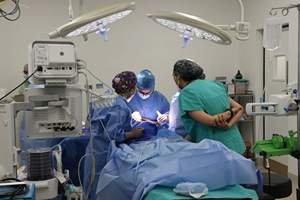Introduction
In the complex landscape of healthcare, medical malpractice (MedMal) disputes have become increasingly common. These disputes can arise from various factors, including misdiagnosis, surgical errors, or improper treatment. Traditionally, such conflicts were resolved through litigation, often resulting in lengthy and costly court battles. However, mediation has emerged as a viable alternative to litigation, offering a more efficient and amicable way to settle disputes. In this article, we will delve into the nuances of analyzing the role of mediation in resolving MedMal disputes, exploring its benefits, processes, challenges, and real-world applications.
Understanding Medical Malpractice
What is Medical Malpractice?
Medical malpractice occurs when a healthcare provider deviates http://treatment-errors-case-studies-digest.raidersfanteamshop.com/how-to-find-a-compassionate-and-competent-medical-malpractice-attorney from the accepted standard of care in the medical community, leading to injury or harm to a patient. This deviation can manifest in various forms:

- Misdiagnosis: Incorrectly diagnosing a condition may lead to inappropriate treatment. Surgical Errors: Mistakes made during surgery can cause significant harm. Medication Errors: Prescribing incorrect medications or dosages can be detrimental.
Each of these situations has legal implications and may warrant compensation for damages incurred by the victim.
The Traditional Litigation Process
The traditional route for resolving MedMal disputes usually involves filing a lawsuit in court. The process typically includes:
Filing a Complaint: The injured party files a complaint outlining their grievances. Discovery Phase: Both parties exchange evidence and information. Trial: A judge or jury hears the case and makes a determination.
This process can be excruciatingly slow and expensive for both parties involved.
Analyzing the Role of Mediation in Resolving MedMal Disputes
Mediation is an alternative dispute resolution (ADR) mechanism that allows conflicting parties to resolve their issues with the help of a neutral third party— the mediator. Unlike litigation, mediation focuses on collaboration rather than confrontation.

How Does Mediation Work?
Mediation typically follows these steps:
Selection of Mediator: Both parties agree on a neutral mediator knowledgeable about MedMal issues. Pre-Mediation Preparation: Parties prepare their statements and supporting documents. Mediation Session: The mediator facilitates discussions between both parties to identify their interests and explore potential solutions. Agreement Drafting: If successful, an agreement is drafted and signed by both parties.This process emphasizes communication over adversarial tactics.
Benefits of Mediation in Medical Malpractice Cases
1. Cost-Efficiency
Litigation can drain financial resources due to attorney fees, court costs, and other expenses. In contrast, mediation is generally less expensive.
2. Time-Saving
Court cases can take years to resolve; mediation sessions are often scheduled within weeks or months.
3. Confidentiality
Mediation proceedings are private, preventing public scrutiny that accompanies courtroom battles.
4. Control Over Outcomes
Parties have more control over the resolution compared to court rulings which may be unpredictable.
5. Preservation of Relationships
Mediation fosters communication that may help preserve professional relationships between healthcare providers and patients.
Challenges of Mediation in MedMal Disputes
While mediation offers numerous advantages, it also comes with challenges:
1. Power Imbalance
Disparities in negotiating power between parties can hinder equitable resolutions.
2. Lack of Legal Precedent
Mediated agreements may not set legal precedents for future cases involving similar issues.
3. Emotional Barriers
Emotions can run high in medical malpractice situations; mediators must navigate these feelings effectively.
Case Studies Demonstrating Successful Mediation Outcomes
To better understand how mediation works in practice, let's examine some real-world examples:
1. Case Study A
In one instance involving a surgical error leading to complications, both parties engaged in mediation where they discussed their perspectives openly with the assistance of an experienced mediator who specialized in medical disputes. Through several sessions filled with empathy and understanding underpinned by facts presented by each party’s attorneys, they reached an agreement that satisfied both sides—substantial compensation for the plaintiff while allowing the physician to maintain their practice without further tarnishing their reputation.
2. Case Study B
Another case involved misdiagnosis where emotional distress played a significant role for the patient involved; they felt unheard by their initial healthcare provider that failed them during treatment decisions leading up to serious health implications down the road post-diagnosis correction years later at another facility altogether! After thorough discussions facilitated by mediators focusing largely on rebuilding trust between doctors/patients instead solely concentrating on financial reparations alone—a unique resolution emerged wherein ongoing therapeutic support was agreed upon from both sides moving forward together!
The Future of Mediation in Medical Malpractice Resolution
As awareness regarding the benefits associated with mediation spreads throughout legal circles—and among patients experiencing harm due negligence—it’s likely we'll continue witnessing increased adoption rates going forward!
Why Is This Important?
With rising healthcare costs coupled alongside public disillusionment surrounding traditional judicial systems—mediation serves as an effective remedy addressing many concerns faced today!
FAQs
1. What types of disputes are suitable for mediation?
Mediation is well-suited for any dispute where communication breakdowns exist between parties—especially those involving personal injury claims like medical malpractice cases!
2. How long does mediation typically take?
The duration varies depending on complexity; however most sessions last anywhere from one hour up until multiple meetings spanning several weeks!
3. Is mediation legally binding?
While mediated agreements aren't automatically enforceable like court orders—they can become binding if documented properly through signed contracts post-discussion concluding outcomes agreed upon respectively beforehand!
4. Can I still pursue litigation after mediation?
Yes! Participants retain rights to initiate lawsuits following unsuccessful attempts at resolving matters via this method should outcomes fail meeting expectations adequately enough!
5 . Do I need an attorney present during mediation?
While not mandatory—having legal counsel present can provide valuable insights throughout discussions ensuring interests remain protected adequately!
6 . What qualifications should I look for when selecting a mediator?
Look for mediators possessing experience specifically within medical malpractice settings along with relevant certifications confirming expertise pertaining directly towards conflict resolution practices overall!
Conclusion
In conclusion, it’s clear that understanding how effective mediations function plays crucial roles when navigating complexities surrounding medical malpractice disputes today! With its cost-saving benefits alongside time efficiencies presenting themselves readily available now—more individuals seeking justice deserve access towards alternatives beyond traditional courtroom settings aiming ultimately towards achieving favorable outcomes collectively achieved through collaborative efforts instead!
As we move forward into ever-evolving landscapes entwined deeply within healthcare industries worldwide—it remains imperative emphasizing importance regarding utilizing approaches fostering harmony wherever possible; thus allowing all stakeholders involved gaining closure needed amidst challenging circumstances alike!
By implementing structured frameworks emphasizing clarity while keeping communication lines open—all parties stand much greater chances finding resolutions beneficially suited accommodating respective needs accordingly!